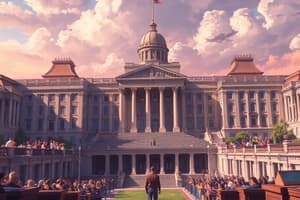Podcast
Questions and Answers
What is the primary role of legislatures?
What is the primary role of legislatures?
- Initiating revenue bills
- Approving treaties
- Enacting laws that govern the country (correct)
- Conducting oversight of the executive branch
Which legislative body is responsible for initiating revenue bills?
Which legislative body is responsible for initiating revenue bills?
- Both the House of Representatives and the Senate
- The House of Representatives (correct)
- The executive branch
- The Senate
In what way do legislatures oversee the executive branch?
In what way do legislatures oversee the executive branch?
- By representing the interests of constituents
- Through hearings, investigations, and subpoena power (correct)
- By enacting laws
- By approving treaties
What is one of the powers of the Senate?
What is one of the powers of the Senate?
Which institution has the power to approve treaties?
Which institution has the power to approve treaties?
What is a common activity members of Congress engage in to oversee the executive branch?
What is a common activity members of Congress engage in to oversee the executive branch?
What is the primary function of the Government Accountability Office (GAO)?
What is the primary function of the Government Accountability Office (GAO)?
Which congressional committees conduct oversight activities in specific policy areas?
Which congressional committees conduct oversight activities in specific policy areas?
Which power allows the Senate to have a role in confirming presidential appointments?
Which power allows the Senate to have a role in confirming presidential appointments?
What is NOT a power of the United States Congress?
What is NOT a power of the United States Congress?
What does the two-thirds vote requirement in both houses of Congress allow them to do?
What does the two-thirds vote requirement in both houses of Congress allow them to do?
What is one of the ways legislatures ensure effective governance in a nation?
What is one of the ways legislatures ensure effective governance in a nation?
Flashcards are hidden until you start studying
Study Notes
Roles, Responsibilities, Functions, and Powers of Legislatures
Introduction
The United States Congress, as outlined in Article I of the U.S. Constitution, is the legislative branch of the federal government. It is a bicameral legislature consisting of the House of Representatives and the Senate. The roles, responsibilities, functions, and powers of legislatures are central to the functioning of a democratic government. These institutions are responsible for drafting and passing laws, overseeing the executive branch, and representing the interests of their constituents.
Roles
The primary role of legislatures is to enact laws that govern the country and its citizens. This includes providing for the common defense and general welfare, regulating commerce and trade, and establishing the federal budget. The House of Representatives is responsible for initiating revenue bills, while the Senate has the power to confirm presidential nominations and approve treaties.
Responsibilities
One of the key responsibilities of legislatures is to provide oversight of the executive branch. This is done through hearings, investigations, and the power to subpoena evidence. Members of Congress spend a significant amount of their time conducting hearings and investigations in committee. The Government Accountability Office (GAO) is a non-partisan, independent agency that provides auditing, analysis, and reporting services to Congress, ensuring that taxpayer dollars are spent effectively and efficiently.
Functions
In addition to legislative functions, legislatures also perform oversight functions to check the power of the executive branch. This is achieved through hearings, investigations, and the power to subpoena evidence. Members of Congress spend a significant amount of their time holding hearings and investigations in committee. The House Committee on Oversight and Government Reform and the Senate Committee on Homeland Security and Government Affairs are examples of committees that conduct oversight in their policy areas.
Powers
The powers of legislatures are vested in a Congress of the United States, which shall consist of a Senate and House of Representatives. Some key powers of the Congress include:
- Legislative Power: All legislative powers herein granted shall be vested in a Congress of the United States.
- Budgeting: The power to enact laws for raising revenue, providing for the common defense and general welfare, and declaring war.
- Judicial Review: The power to enact laws for regulating the land and naval forces, providing for calling forth the militia to execute the laws of the Union, suppress insurrections and repel invasions, and to provide for organizing, arming, and disciplining the militia.
- Impeachment: The power to impeach federal officials and to elect the President in the case of an Electoral College tie.
- Confirmation of Appointments: The Senate's role in confirming presidential appointments.
- Treaty Ratification: The Senate's power to ratify treaties with the consent of the House of Representatives.
- Veto Override: The power to override a presidential veto with a two-thirds vote in both houses of Congress.
In conclusion, legislatures play a crucial role in the functioning of a democratic government. They are responsible for drafting and passing laws, overseeing the executive branch, and representing the interests of their constituents. The roles, responsibilities, functions, and powers of legislatures are essential for ensuring the effective governance of a nation.
Studying That Suits You
Use AI to generate personalized quizzes and flashcards to suit your learning preferences.




